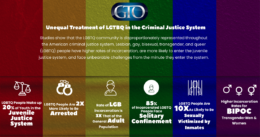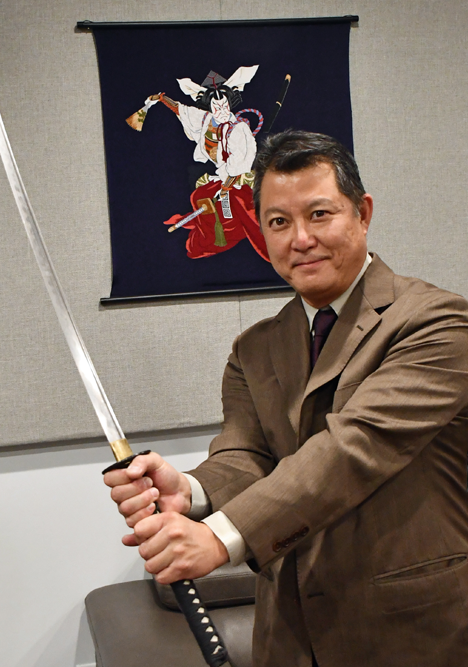From Incarceration to Parole, Facts on the Disparities the LGBTQ Community Faces in the Justice System
Studies show that the LGBTQ community is disproportionately represented throughout the American criminal justice system. Lesbian, gay, bisexual, transgender, and queer (LGBTQ) people have higher rates of incarceration, are more likely to enter the juvenile justice system, and face unbearable challenges from the minute they enter the system.
At the Law Offices of Garrett T. Ogata, we are proud to represent members of the LGBTQ community. We are avid supporters and advocates of lesbian, gay, bisexual, questioning, gender nonconforming and transgender people throughout Las Vegas and the surrounding area.
If you have been arrested for a crime and are a member of the LGBTQ community, contact our office for a free, no-obligation consultation.
- The LGBTQ Community is Overrepresented at Every Stage of the Criminal Justice System.
According to the non-profit, non-partisan Prison Policy Initiative, the LGBTQ community is overrepresented at every stage of the criminal justice system, from a large percentage of LGBTQ youth in juvenile detention to higher rates of incarceration and a more considerable amount of gay, lesbian and transgender men and women being put on probation and parole.
The most recent Gallup poll indicates that 5.6% of adults in the United States identify as lesbian, gay, bisexual, or transgender. Still, LGBTQ people are over 2x more likely to be arrested than straight individuals and are incarcerated at a rate of 3x that of the general adult population.
- LGBTQ Youth More Likely to Enter Juvenile Detention.
Research from the Prison Policy Initiative shows that as many as 20% of youth in the juvenile justice system identify as “lesbian, gay, bisexual, questioning, gender nonconforming, or transgender.” LGBTQ youth are significantly more likely to enter the criminal justice system despite only representing 4-6% of the general population.
A collaborative study about LGBTQ incarcerated youth showed that:
- 3.2% of boys in juvenile justice facilities identify as LGBTQ or gender nonconforming.
- 39% of girls in juvenile justice facilities identify as LGBTQ or gender nonconforming.
- 85% of the youth that identifies as LGBTQ or gender nonconforming in juvenile justice facilities are youth of color.
- 15% of boys who identify as gay or bisexual reported sexual contact with staff compared with 8.9% of boys in the juvenile justice system identifying as heterosexual.
- 4.6% of girls who identify as lesbian or bisexual reported sexual contact with staff compared with 2.2% of girls in the juvenile justice system identifying as heterosexual.
Across the board, LGBTQ youth in the juvenile justice system report higher rates of mistreatment by staff, abuse by other youth, and a lack of supportive services.
- Lesbian, Gay, and Bisexual People Are More Likely to Be Arrested.
People identifying as gay, lesbian, or bisexual are 2.25x more likely to be arrested compared with people who consider themselves straight or heterosexuals.
Using data from the National Survey on Drug Use and Health (NSUDH), the Prison Policy Initiative found that lesbian and bisexual women were nearly 4x as likely to be arrested compared with straight women. Gay and bisexual men were 1.35x more likely to be arrested than straight men.
- LGB People Are Incarcerated at a Rate 3x That of the General Adult Population.
Research also shows that LGB individuals are incarcerated at a rate 3x that of the general adult population. Again the disparity is mainly with women who identify as LGBTQ compared to women who identify as heterosexual. 33.3% of the women in prison identify as lesbian or bisexual, compared with only 3.4% in the general population. In county and municipal jails, nearly 25% of women consider themselves lesbian or bisexual.
- Gay, Lesbian, and Bisexual Men and Women Have Longer Sentences Imposed on Them.
Not only do studies indicate that men and women who identify as LGBTQ have higher rates of arrest, incarceration, mistreatment, and abuse, but they also have longer sentencing imposed on them.
Research suggests that one of the reasons that LGBT people face longer systems is the discriminatory enforcement of laws. Individuals who identify as lesbian, gay, bisexual, transgender, or queer are disproportionately impacted by several laws, including drug chargesand sex offenses.
- LGBTQ Men and Women Are More Likely to Be Put in Solitary Confinement.
Despite knowing the detrimental effect it can have on an individual, incarcerated LGBTQ men and women are substantially more likely to be placed in solitary confinement. One study reported by the Prison Policy Initiative indicates that 85% of LGBTQ individuals surveyed indicated they had been placed in solitary confinement at some point during their incarceration.
Black, indigenous, and people of color (BIPOC) individuals identifying as LGBTQ faced further discrimination and were 2x as likely to be placed in solitary confinement than their white LGBTQ counterparts.
- LGB Inmates Are 10x As Likely to be Sexually Victimized by Inmates.
Lesbian, gay, or bisexual inmates and individuals who do not identify as LGB but report as men who have sex with men (MSM) and women who have sex with women (WSW) are 10x more likely to be sexually victimized by another inmate. For individuals incarcerated in prison or jail, 2.1% of straight men and women report being victimized by another incarcerated person, compared to 12.2% of lesbian, gay, bisexual, MSM, and WSW inmates.
Furthermore, lesbian, gay, bisexual, MSM, and WSW inmates report higher rates of victimization by staff when compared with people in prison identifying as heterosexual. 1.2% of straight people in prison report being sexually victimized by a staff member, compared with 5.4% of LGB, MSM, and WSW people in prison.
- LGBTQ People Are More Likely to be Put on Probation and Parole.
Men and women who identify as LGBTQ are substantially more likely to be required to complete community supervision (probation or parole) compared with heterosexual individuals.
Data shows that people on probation or parole are nearly 2x more likely to be lesbian, gay, and bisexual. In addition:
- There are an estimated 3.4% of women who identify as lesbian or bisexual in the general population.
- But 16.7% of women on probation and 17.6% of women on parole are lesbian or bisexual.
- There are an estimated 3.6% of men who identify as gay or bisexual in the general population.
- But, 5.7% of men on probation and 6.4% of men on parole identify as gay or bisexual.
- Therefore, women on parole or probation are nearly 3x as likely to be lesbian or bisexual compared with women not on parole or probation.
- Men on parole are nearly 2x as likely, and men on probation are slightly more likely to be gay or bisexual compared with men not on community supervision.
- Transgender People Are More Likely to Be Incarcerated
Men and women who identify as transgender face even greater battles in the criminal justice system. Not only are trans individuals more likely to have interactions with law enforcement, many report being harassed by police. A recent survey found that 1 in 6 people who identify as transgender have been incarcerated during their lifetime.
- BIPOC Transgender Men and Women Have High Lifetime Rates of Incarceration.
BIPOC transgender men and women have higher lifetime rates of incarceration when compared with white trans individuals.
According to the Prison Policy Initiative, 12% of white transgender individuals have been sent to prison or jail in their lifetime compared with:
- 25% of Latinx transgender individuals;
- 13% of Asian trans people;
- 30% of American Indians identifying as transgender;
- 21% of multiracial transgender people; and
- 47% of Black transgender individuals.
Without significant reform in the criminal justice system and institutions throughout the country, LGBTQ individuals will continue to face high rates of discrimination, incarceration, and abuse. The Prison Policy Initiative calls for “broad social and policy changes” across multiple realms to help end the crisis.
Contact the Law Offices of Garrett T. Ogata
At the Law Offices of Garret T. Ogata, we proudly support the LGBTQ community of Las Vegas. We are here to help those who are facing criminal charges or are the target of a law enforcement investigation. Contact our office today for a free, confidential consultation. Get the unbiased, aggressive representation you deserve. Let us help protect your rights and your future. Call or text to get started.



